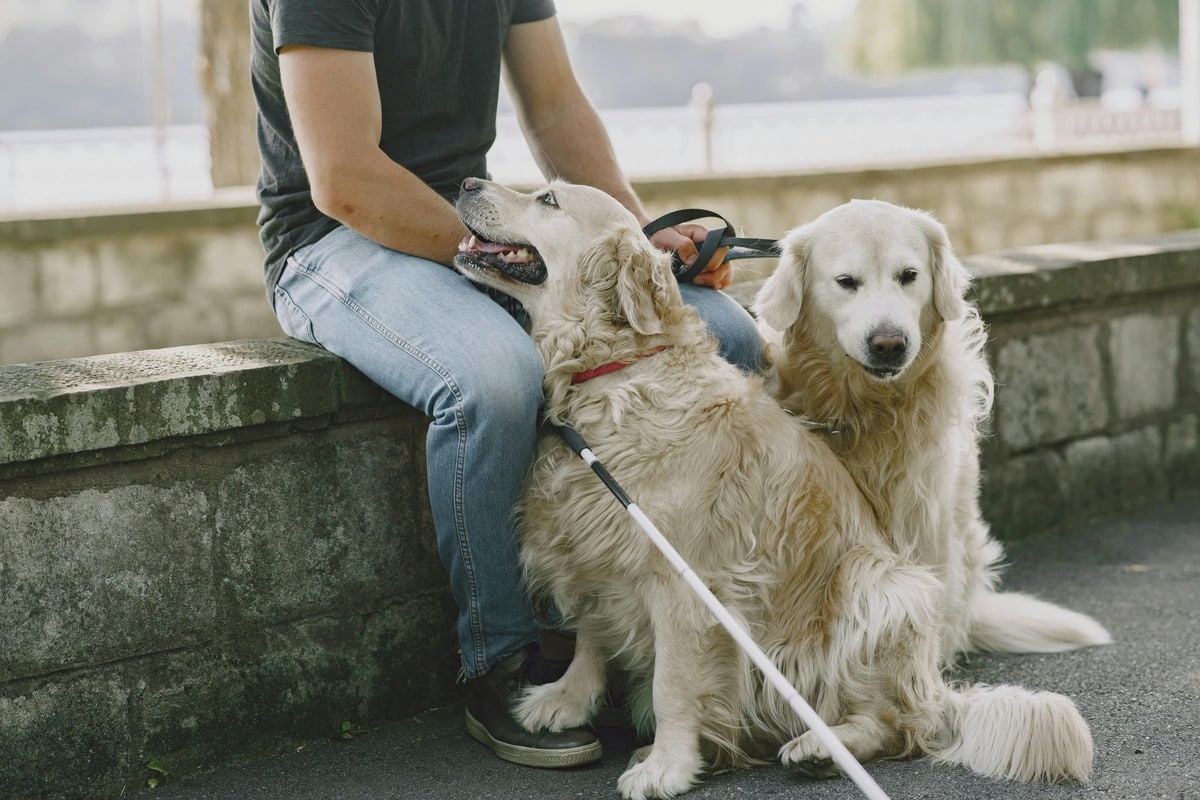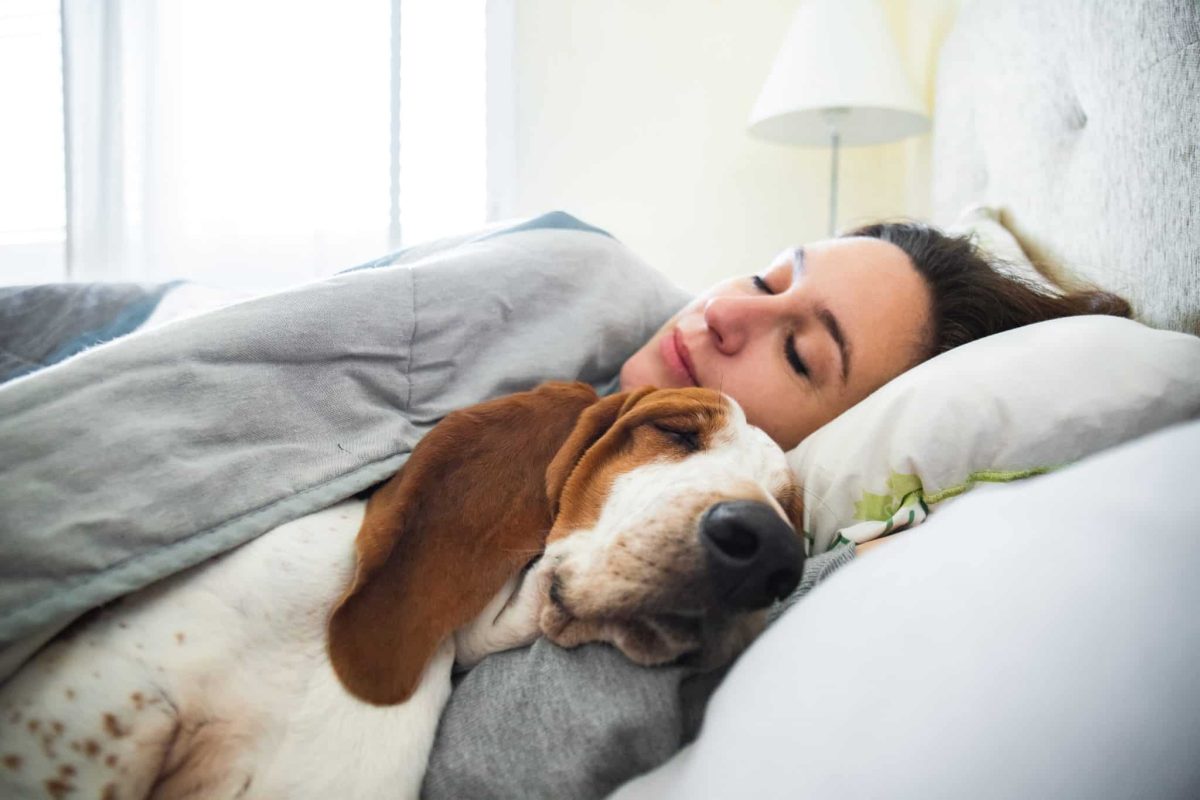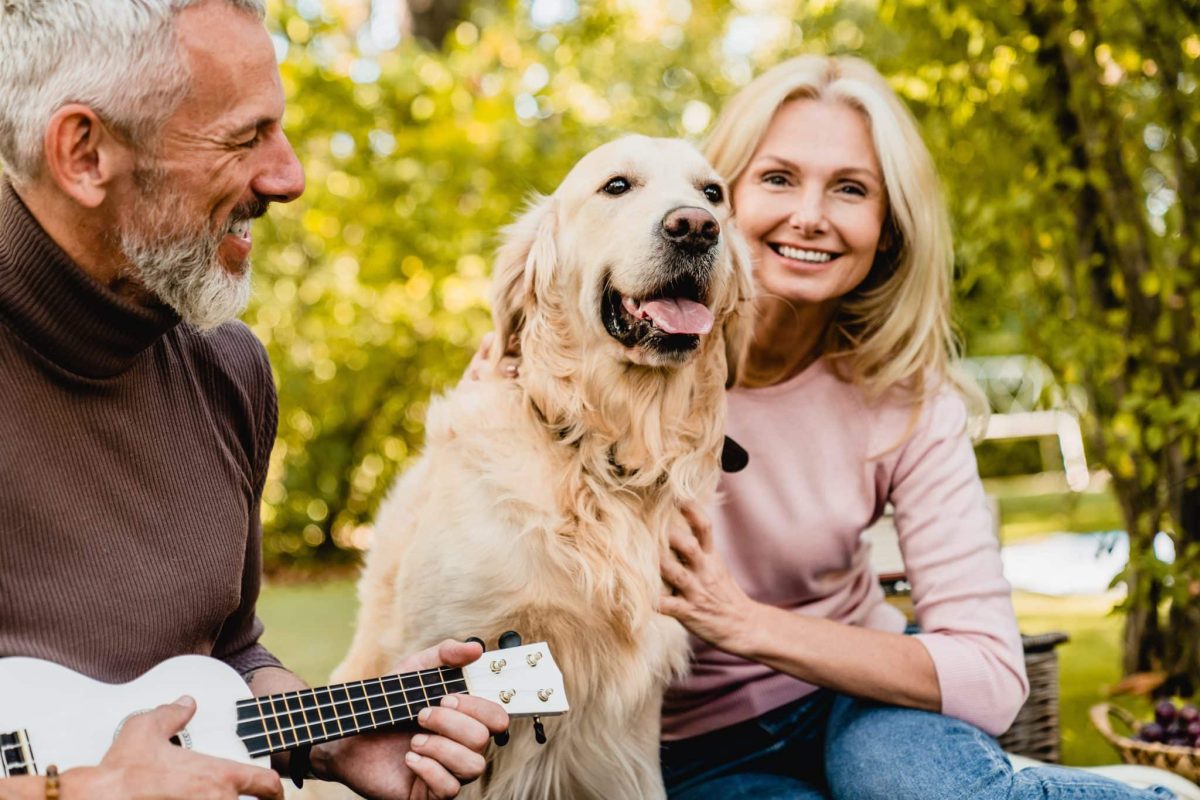
Check out our latest products
Shutterstock
Life after 40 is a mixed bag—career curveballs, quieter homes, mystery aches, and hangovers that now require PTO. Amid all this midlife madness, mental health can quietly slide to the back burner. Enter dogs: no diplomas, hourly rates, just pure, slobbery therapy on four legs. These loyal companions don’t just warm your feet—they boost your mood, create comforting routines, and never question your growing collection of ergonomic sneakers. Backed by science and fueled by love, dogs are the low-maintenance therapists we didn’t know we needed—but definitely do.
Daily Walks = Daily Endorphins

Shutterstock
Nothing pulls you off the couch like those pleading puppy eyes and the leash in their mouth. Dogs need walks, which means you get exercise. Regular movement boosts endorphin levels—those feel-good chemicals in your brain—leading to improved mood and decreased symptoms of anxiety and depression. The fresh air and sunlight help regulate your circadian rhythm and vitamin D intake. It’s like a fitness coach with fur.
Emotional Support That Doesn’t Talk Back

Shutterstock
Dogs are excellent listeners who never interrupt with unwanted advice or “Well, back in my day…” speeches. Their quiet, comforting presence provides emotional stability, especially during life’s more reflective or turbulent times. Petting a dog releases oxytocin, the “love hormone,” which fosters feelings of trust and emotional bonding. This non-verbal support system helps ease feelings of loneliness or overwhelm, especially after tough days.
Encourages a Consistent Routine

Shutterstock
Feeding, walking, bathroom breaks—dogs need structure, and they provide it for you. Adults over 40 often face schedule shifts, especially post-retirement or with children moving out. Having a dog introduces a steady routine, giving your day shape and purpose. This predictability can combat symptoms of depression and provide a sense of normalcy.
Helps Reduce Social Isolation

Shutterstock
Walking a dog is like carrying a VIP pass to spontaneous neighborhood chats. Dogs are fantastic social icebreakers and can help foster new relationships with fellow dog lovers. Dogs facilitate more human interaction by nodding to someone at the dog park or joining local pet clubs. That sense of connection becomes even more vital as social circles naturally change with age.
Decreases Anxiety Through Sensory Grounding

Shutterstock
The texture of fur under your fingertips, the sound of steady breathing beside you, the rhythmic motion of stroking your pup—dogs help ground you in the present. This sensory engagement reduces anxious thoughts by focusing your attention on a comforting physical experience. It’s a calming, non-medicinal form of mindfulness available 24/7 and with a wagging tail.
A Loyal Companion During Life Transitions

Shutterstock
Turning 40 and beyond often involves major transitions—career shifts, health scares, or becoming an empty nester. During such times, the presence of a loyal dog can provide emotional steadiness. Their companionship reduces feelings of abandonment or sadness and reminds you that you’re never truly alone. They don’t just share your home; they share your journey.
Boosts Feelings of Purpose

Shutterstock
Dogs depend on you for food, exercise, and affection. That dependence fosters a strong sense of responsibility and purpose—something that can waver as children grow up or careers wind down. Knowing that your pup needs you daily instills a renewed sense of importance and relevance, which can be incredibly powerful in maintaining a healthy self-image.
Enhances Mindfulness and Present-Moment Awareness

Shutterstock
Dogs live entirely in the now. They don’t worry about yesterday’s regrets or tomorrow’s to-do list. Their joyful, in-the-moment behavior can serve as a model for mindfulness. Watching your dog savor a sunbeam or wag uncontrollably over a tennis ball reminds you to appreciate life’s simple pleasures. It’s like having a Zen master who sheds on the furniture.
Supports Grief and Emotional Healing

Shutterstock
Whether it’s the loss of a loved one, a divorce, or facing an empty nest, grief can feel suffocating. Dogs intuitively provide silent support during these times, often snuggling close when you need it most. Their presence can be a gentle distraction and emotional balm, making the grieving process more bearable. Their loyalty and love offer a unique healing that doesn’t require words.
Encourages Laughter and Play

Shutterstock
Adults over 40 sometimes forget the art of being silly, but dogs are natural goofballs. From zoomies around the living room to failed attempts at catching a treat mid-air, dogs constantly inject humor into daily life. Laughter reduces stress hormones and boosts immune function. So yes, that belly laugh when your dog barks at his own reflection is actually good for you.
Decreases Blood Pressure and Heart Rate

Shutterstock
Studies show that petting a dog can lower blood pressure and heart rate, both signs of reduced stress. This is more than comforting for adults navigating midlife health challenges—it’s medically significant. Sharing space with a calm dog creates a serene environment, often reducing the physical symptoms of anxiety and chronic stress. It’s basically a cuddle-powered chill pill.
Provides Unconditional Acceptance

Shutterstock
Dogs don’t care if you’ve got a few extra wrinkles, a spare tire, or if you can’t remember where you left your reading glasses. They greet you with joy, not judgment. That unconditional love is rare and incredibly affirming, especially as people age and become more self-critical. Your dog sees only one version of you: their favorite human.
Acts as a Natural Antidepressant

Shutterstock
Multiple studies have shown that dog owners experience lower rates of clinical depression. While dogs aren’t a replacement for therapy or medication, they’re a fantastic supplement. Their loyalty, affection, and demand for engagement keep you out of bed and involved in life. Their love can be the emotional lift you need on darker days.
Sparks Joy Through Nurturing

Shutterstock
The act of caring for another being can be deeply therapeutic. Feeding your dog, brushing their coat, or giving them medicine channels your energy into something positive and nurturing. This caretaking releases dopamine and oxytocin, hormones associated with pleasure and bonding. It helps shift the focus from internal worry to external love.
Improves Sleep Quality

Shutterstock
Dogs provide comfort and safety, which can lead to more restful sleep. Their presence can ease nighttime anxiety, reduce feelings of vulnerability, and even act as a warm, fuzzy sound machine. For adults over 40—when sleep issues often become more common—a dog’s calming influence can help establish better sleep hygiene and relaxation before bed.
They’re Mental Health MVPs

Shutterstock
If life after 40 feels like a browser with too many tabs open, a dog might be just the refresh button you need. These four-legged therapists won’t charge cancellation fees or dig into your childhood trauma—but they will offer unconditional love, soulful stares, and the kind of presence that soothes the soul. Whether navigating midlife surprises or needing a reason to go outside, a loyal pup can bring calm, joy, and a lot of healing—no co-pay or deep introspection required.







![[5G & 2.4G] 2K Indoor Security Camera for Home Security, AI Voice Change for 2-Way Talk, Motion Detection, Night Vision, 24/7 SD Recording/Cloud Storage, WiFi Home Camera, Pet Cam with Phone App](https://i3.wp.com/m.media-amazon.com/images/I/61I2U+sTT3L._AC_SL1500_.jpg?w=300&resize=300,300&ssl=1)






